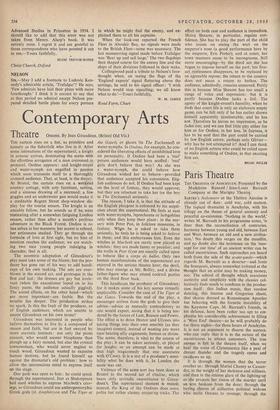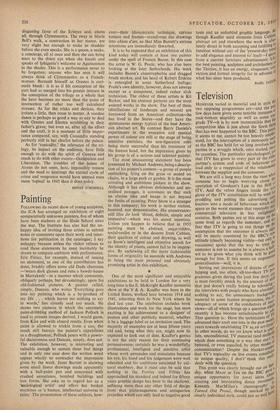Paris Theatre
THE ORESTEIA OF AESCHYLUS. Presented by the Madeleine Renaud / Jean-Louis Barrault Company at the Marigny Theatre.
SARTRE'S Nekrassov at the Thatre Antoine is already out of date: cold war, cold mutton. The topical dramatist is Aeschylus, with his trilogy on the theme of general amnesty and peaceful co-existence. 'Nothing in the world,' writes M. Barrault in his programme notes, 'is finer than the reconciliation of contraries, harmony between young and old, between East and West, between an old and a new civilisa- tion.' No doubt this verges on the maudlin, and no doubt also the insistence on the 'mes- sage for our time' of an ancient writer can be called meretricious. Such reproaches are heard both from the side of the avant-garde—which regards M. Barrault as a deserter—and from the bourgeois, always somewhat irritated at the thought that an artist may be making money, too. The school of thought which associates austerity and simplicity with the classics col- lectively finds much to condemn in the produc- tion itself : this Indian music, that voodoo dancing, this incense and Gregorian chant, that chorus dressed as Romanesque Apostles but behaving with the frenetic instability of the Keystone Cops. M. Barrault's friends, in his defence, have been rather too apt to em- phasise his considerable achievement in filling a 'West End' theatre—as he will probably do for thirty nights—for three hours of Aeschylus. It is not an argument to disarm the austere, who can reply that it is in the nature of the meretricious to attract customers. The true answer is felt in the theatre itself, when we hear the voice of Clytemnestra like a peal of distant thunder and the tragedy opens and swallows us up.
It is through the women that the terror reaches us : through Muriel Chaney as Cassan- dra, in the weight of her darkness and stillness, and then in the intense glare of the lighting-up as she projects her vision of the murder until an arm beckons from the door; through the baying chorus of collective political widows who incite Orestes to revenge; through the
disgusting farce of the Erinyes and, above all, through Clytemnestra. The sway in Marie Bell's walk, a contraction in her stance, are very slight but enough to make us shudder before she even speaks. She is a queen, a snake, a concierge, all at once and then she can bring tears to the driest eye when she kneels and speaks of 1phigenia's welcome to Agamemnon in the shades. This is a performance never to be forgotten; anyone who has seen it will always think of Clytemnestra as a French- woman. Barrault himself as Orestes is curi- ously blank: it is as if his conception of the part had so merged into his greater interest in the conception of the trilogy as a whole that the hero becomes no more than the point of intersection of rather too well calculated stresses. As for the tricks and devices, they irritate a little, then cease to matter. A voodoo dance is perhaps as good a way as any to deal with Orestes and Electra scrabbling in their father's grave; but even so, after all the effort and the craft, it is a moment of little impor- tance compared, say, with Cassandra standing perfectly still in her chariot before the palace.
As for 'topicality,' the relevance of the tri- logy, its impact on the audience, have little enough to do with the spirit of Geneva and much to do with other events—Occupation and Liberation. The troubles of the house of Atreus do not seem, here, impossibly remote and the need to interrupt the eternal cycle of crime and vengeance would have seemed even more 'topical' in 1945 than it does today.
DONAT O'DONNELL



































 Previous page
Previous page